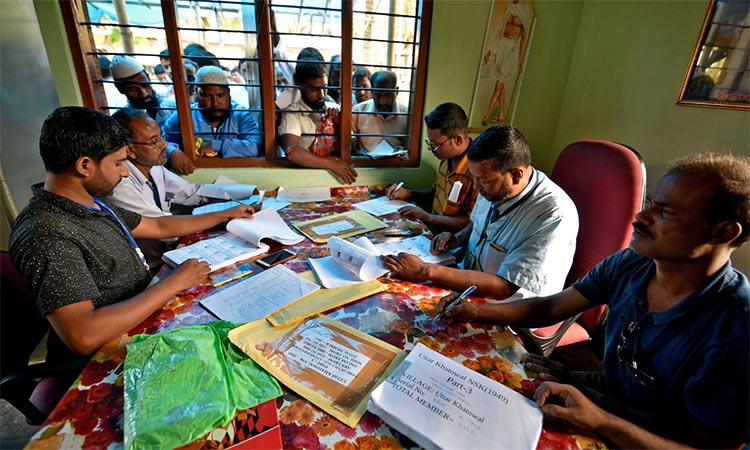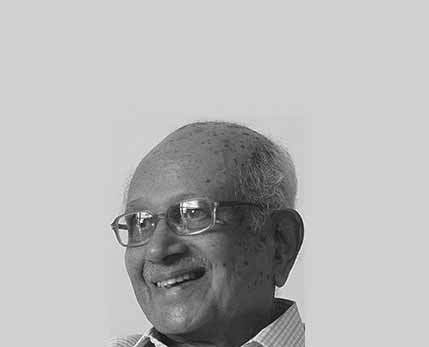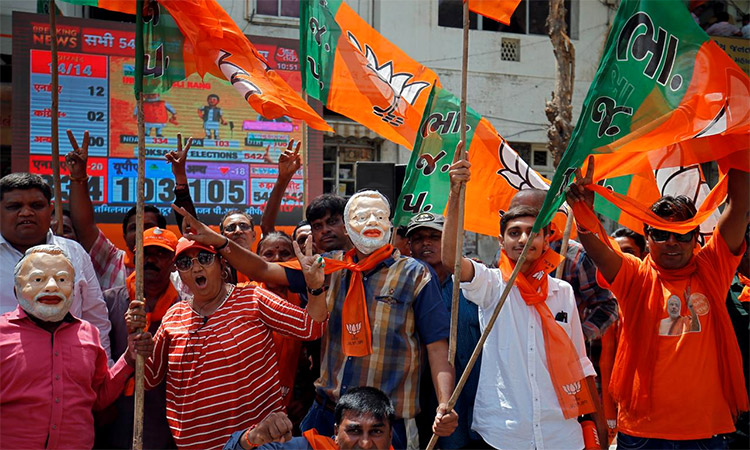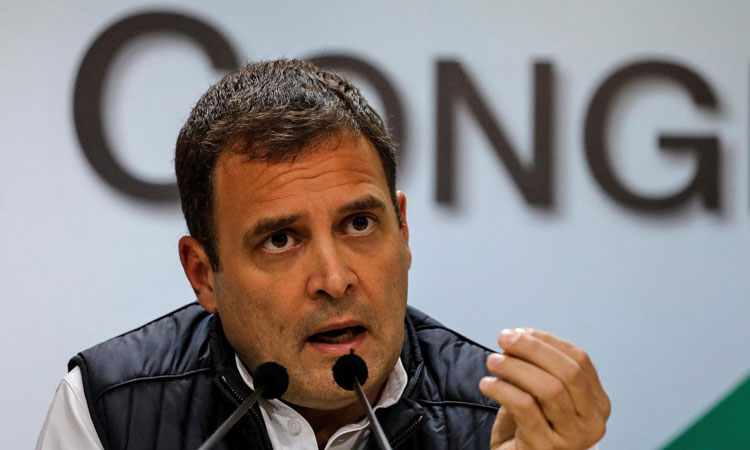Citizenship review a source of worry for minorities
BRP Bhaskar

ndian officials sort papers for illegal immigrants from Bangladesh. File/ Reuters
The sword of Damocles is hanging over the heads of minorities with the Indian government planning to extend to the entire country the scheme to draw up a National Register of Citizens. At present the scheme is confined to the eastern state of Assam.
Influx into Assam from neighbouring states in search of livelihood began during the colonial period. There was large-scale migration to the state from Pakistan’s eastern wing (now Bangladesh) after Partition. This prompted India to enact a law styled as Immigrants (Expulsion from Assam) Act in 1950.
During the 1951 census, acting on a Home Ministry directive, enumerators recorded particulars of every resident of the state with a view to identifying illegal immigrants and prepared a National Register of Citizens (NRC) excluding them.
It was a dubious exercise as regulations requiring passport and visa for travel between India and Pakistan did not come into force until October 1952. It was only in 1957 that the Foreigners Act of 1946 was amended to bring a Pakistani national within the definition of the term ‘foreigner’.
The 1961 census report estimated that more than 2,200,000 people had entered Assam illegally over a decade. Identification and expulsion of illegal immigrants was one of the major demands of the All Assam Students Union and the All Assam Gana Sangram Parishad which launched an agitation that disrupted life in the state for six years from 1979.
The Assam Accord, which the state government signed with AASU and AAGSP at the instance of Prime Minister Rajiv Gandhi, provided for detection and expulsion of all those who entered the state illegally between January 1, 1966 and March 24, 1971.
However, the process did not go beyond a pilot project aimed at updating the NRC in two small administrative units to help identify the illegal immigrants there.
In 2013 the Supreme Court, acting on two writ petitions, ordered state-wide updating of the NRC. The process has been going on ever since under the court’s supervision.
There have been charges that the updating process is vitiated by political and bureaucratic manipulation. As many as 3.6 million out of 4.1 million whose names were dropped from the NRC have appealed against their exclusion.
The nation was shocked when Mohammad Sanaullah, a Kargil war veteran and recipient of the President’s Medal, was declared a foreigner and dragged to a detention centre in Assam recently. He languished there for a fortnight before the high court released him on bail, pending scrutiny of the issue of his citizenship.
On the government’s own admission the NRC, as it now stands, leaves out many genuine names and includes many bogus names.
The deadline the Supreme Court set for completing the process of updating the NRC expires on July 31. It is clear that the work cannot be finished by that date. Some 2.5 million people whose petitions against exclusion from NRC have sought extension of the deadline. It is for the apex court to take a call on the issue.
According to a Congress MP, the vexatious citizenship issue has resulted in 57 suicides in the state so far.
Even as Assam struggles to produce a clean NRC, Home Minister Amit Shah told Parliament that the government intends to extend the NRC nationwide to “wean out illegal immigrants from every inch of this country”. In its election manifesto, the Bharatiya Janata Party had said it would extend the NRC scheme to the other states in a phased manner. It views its mandate as popular approval for the idea. But illegal immigration was not a live issue in any state other than Assam and a nationwide NRC did not figure prominently even in the BJP’s election campaign anywhere.
The BJP’s fascination for an all-India NRC cannot be divorced from its concept of India as a Hindu nation and its strategy of promoting communal polarisation to achieve that end. Quite naturally the move has caused unease in the minorities, particularly Muslims, who more often than not are Hindutva’s targets.
The communal mindset behind the BJP’s approach to the citizenship issue is evident from its decision to accept all Hindus and Buddhists who came into India from the neighbouring countries.
It is not clear what the government proposes to do with those excluded from the NRC. The countries of their origin are not parties to the ongoing process and have no obligation to accept those declared illegal immigrants or their descendants. --Gulf Today, Sharjah, July 23,2019.
Influx into Assam from neighbouring states in search of livelihood began during the colonial period. There was large-scale migration to the state from Pakistan’s eastern wing (now Bangladesh) after Partition. This prompted India to enact a law styled as Immigrants (Expulsion from Assam) Act in 1950.
During the 1951 census, acting on a Home Ministry directive, enumerators recorded particulars of every resident of the state with a view to identifying illegal immigrants and prepared a National Register of Citizens (NRC) excluding them.
It was a dubious exercise as regulations requiring passport and visa for travel between India and Pakistan did not come into force until October 1952. It was only in 1957 that the Foreigners Act of 1946 was amended to bring a Pakistani national within the definition of the term ‘foreigner’.
The 1961 census report estimated that more than 2,200,000 people had entered Assam illegally over a decade. Identification and expulsion of illegal immigrants was one of the major demands of the All Assam Students Union and the All Assam Gana Sangram Parishad which launched an agitation that disrupted life in the state for six years from 1979.
The Assam Accord, which the state government signed with AASU and AAGSP at the instance of Prime Minister Rajiv Gandhi, provided for detection and expulsion of all those who entered the state illegally between January 1, 1966 and March 24, 1971.
However, the process did not go beyond a pilot project aimed at updating the NRC in two small administrative units to help identify the illegal immigrants there.
In 2013 the Supreme Court, acting on two writ petitions, ordered state-wide updating of the NRC. The process has been going on ever since under the court’s supervision.
There have been charges that the updating process is vitiated by political and bureaucratic manipulation. As many as 3.6 million out of 4.1 million whose names were dropped from the NRC have appealed against their exclusion.
The nation was shocked when Mohammad Sanaullah, a Kargil war veteran and recipient of the President’s Medal, was declared a foreigner and dragged to a detention centre in Assam recently. He languished there for a fortnight before the high court released him on bail, pending scrutiny of the issue of his citizenship.
On the government’s own admission the NRC, as it now stands, leaves out many genuine names and includes many bogus names.
The deadline the Supreme Court set for completing the process of updating the NRC expires on July 31. It is clear that the work cannot be finished by that date. Some 2.5 million people whose petitions against exclusion from NRC have sought extension of the deadline. It is for the apex court to take a call on the issue.
According to a Congress MP, the vexatious citizenship issue has resulted in 57 suicides in the state so far.
Even as Assam struggles to produce a clean NRC, Home Minister Amit Shah told Parliament that the government intends to extend the NRC nationwide to “wean out illegal immigrants from every inch of this country”. In its election manifesto, the Bharatiya Janata Party had said it would extend the NRC scheme to the other states in a phased manner. It views its mandate as popular approval for the idea. But illegal immigration was not a live issue in any state other than Assam and a nationwide NRC did not figure prominently even in the BJP’s election campaign anywhere.
The BJP’s fascination for an all-India NRC cannot be divorced from its concept of India as a Hindu nation and its strategy of promoting communal polarisation to achieve that end. Quite naturally the move has caused unease in the minorities, particularly Muslims, who more often than not are Hindutva’s targets.
The communal mindset behind the BJP’s approach to the citizenship issue is evident from its decision to accept all Hindus and Buddhists who came into India from the neighbouring countries.
It is not clear what the government proposes to do with those excluded from the NRC. The countries of their origin are not parties to the ongoing process and have no obligation to accept those declared illegal immigrants or their descendants. --Gulf Today, Sharjah, July 23,2019.


